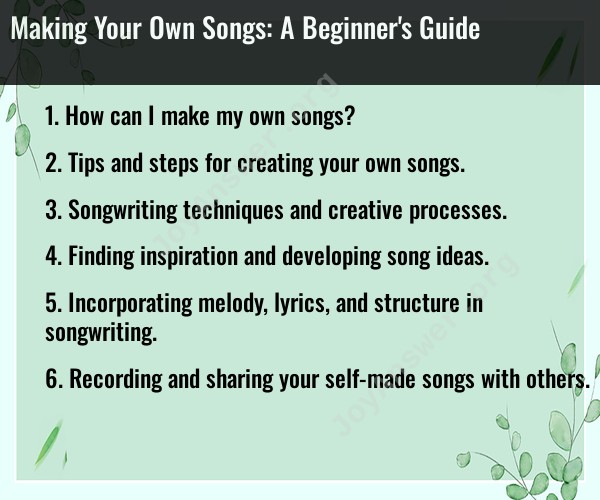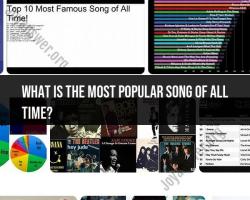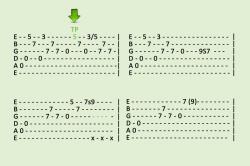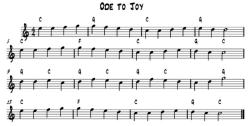How can I make my own songs?
Creating your own songs is a fulfilling creative process, and you don't need to be a professional musician to get started. Here's a beginner's guide to help you make your own songs:
1. Start with Inspiration:
- Songs often begin with an idea, emotion, or experience. Inspiration can come from personal stories, your surroundings, or even your imagination. Keep a journal or digital notes to capture ideas as they arise.
2. Learn Basic Music Theory:
- While you don't need an extensive knowledge of music theory, understanding the basics can be helpful. Learn about scales, chords, and song structures (e.g., verses, choruses, bridges).
3. Choose an Instrument:
- If you play an instrument (e.g., guitar, piano, or ukulele), that's a great place to start. If not, consider learning a beginner-friendly instrument or use digital tools to create music.
4. Write Lyrics:
- Start writing lyrics that convey your message or tell your story. Don't worry about making them perfect at this stage; just get your ideas down on paper.
5. Compose Melodies:
- Experiment with melodies that fit your lyrics. You can create melodies by playing chords on your instrument and singing along. Try to match the mood of your lyrics.
6. Structure Your Song:
- Decide on the structure of your song. Most songs include verses, a chorus, and, optionally, a bridge. You can choose your structure based on what fits your message.
7. Rhyme and Rhythm:
- Consider rhyme and rhythm in your lyrics. Rhyming can make your song catchier, and rhythm gives it a musical flow.
8. Record Your Ideas:
- Use a smartphone or recording software to capture your musical ideas, melodies, and lyrics. This is essential for preserving your creative process.
9. Experiment:
- Don't be afraid to experiment with different chord progressions, melodies, and lyrics. Trying out different approaches can lead to unique and interesting songs.
10. Refine Your Song:
- Review your recorded ideas and choose the best parts. Refine your lyrics and melodies, and consider the overall structure and arrangement.
11. Seek Feedback:
- Share your song with friends or family and ask for their feedback. Constructive criticism can help you improve your songwriting.
12. Record and Produce:
- If you're comfortable, record your song using simple recording equipment or software. You can also collaborate with a musician or producer if you're not ready to handle the technical aspects.
13. Share Your Song:
- Share your song with others. You can perform it at open mics, share it on social media, or upload it to platforms like YouTube, SoundCloud, or Bandcamp.
14. Learn and Grow:
- Keep making songs and learning from each experience. The more you create, the more you'll develop your songwriting skills.
Remember that your first songs may not be perfect, and that's okay. Songwriting is a skill that improves over time with practice and experimentation. The most important thing is to express yourself and enjoy the creative process. Your unique voice and experiences will shine through in your music.
Tips and steps for creating your own songs
- Start with a strong idea. What is the central theme or message of your song? What kind of mood or feeling do you want to evoke? Once you have a good understanding of your concept, you can start to develop it into a song.
- Experiment with different songwriting techniques. There are many different ways to write a song. Try experimenting with different structures, melodies, and lyrics. Don't be afraid to break the rules and find your own unique style.
- Find inspiration in the world around you. Pay attention to the things that move you, both positive and negative. These experiences can be a rich source of inspiration for your songwriting.
- Don't be afraid to share your songs with others. Once you have written a song, share it with other musicians and songwriters for feedback. This can help you to identify areas where your song can be improved.
Songwriting techniques and creative processes
There are many different songwriting techniques and creative processes that you can use to create your own songs. Here are a few examples:
- Freewriting: Freewriting is a great way to generate new song ideas. Simply start writing down whatever comes to mind, without worrying about grammar or spelling. Once you have a few minutes of writing, you can start to look for patterns and ideas that you can use in your songs.
- Stream-of-consciousness: Stream-of-consciousness is similar to freewriting, but it is more focused on capturing your thoughts and feelings as they happen. This can be a great way to generate raw and emotional lyrics.
- Melodic improvisation: Melodic improvisation is a great way to develop new melodies for your songs. Simply start humming or singing a melody and see where it takes you. You can use a variety of techniques, such as repetition, variation, and contrast.
- Lyrical experimentation: Lyrical experimentation is a great way to find your own unique voice as a songwriter. Try using different poetic devices, such as metaphors, similes, and personification. You can also experiment with different rhyme schemes and rhythms.
Finding inspiration and developing song ideas
Songwriters draw inspiration from a variety of sources, including their own life experiences, the world around them, and other musicians and songwriters. Here are a few tips for finding inspiration and developing song ideas:
- Keep a journal or notebook to jot down ideas. This will help you to capture your thoughts and feelings as they come to you.
- Listen to other music and pay attention to what you like and dislike. What makes the songs you like so appealing to you? Can you incorporate any of those elements into your own songwriting?
- Collaborate with other musicians and songwriters. Bouncing ideas off of others can help you to come up with new perspectives and to develop your songs.
Incorporating melody, lyrics, and structure in songwriting
Melody, lyrics, and structure are three essential elements of songwriting. Here are a few tips for incorporating them into your songs:
- Melody: The melody is the tune of your song. It is important to create a melody that is catchy and memorable. Try experimenting with different rhythms and patterns.
- Lyrics: The lyrics are the words to your song. They should be meaningful and relevant to the central theme or message of your song. Try using different poetic devices and language to create vivid imagery and emotions.
- Structure: The structure of your song is the way that the different sections of your song are arranged. A typical song structure includes a verse, chorus, bridge, and outro. However, you can experiment with different structures to create your own unique sound.
Recording and sharing your self-made songs with others
Once you have written and recorded your song, you may want to share it with others. There are many different ways to do this:
- Upload your song to streaming platforms. Streaming platforms like Spotify, Apple Music, and Amazon Music make it easy for people to listen to your music.
- Share your song on social media. Use social media platforms like Facebook, Instagram, and Twitter to share your music with your followers.
- Play live shows. Playing live shows is a great way to connect with fans and to promote your music.
- Submit your song to blogs and radio stations. Submitting your song to blogs and radio stations can help you to reach a wider audience.
Creating your own songs can be a rewarding experience. By following the tips and steps above, you can start creating your own music and sharing it with the











